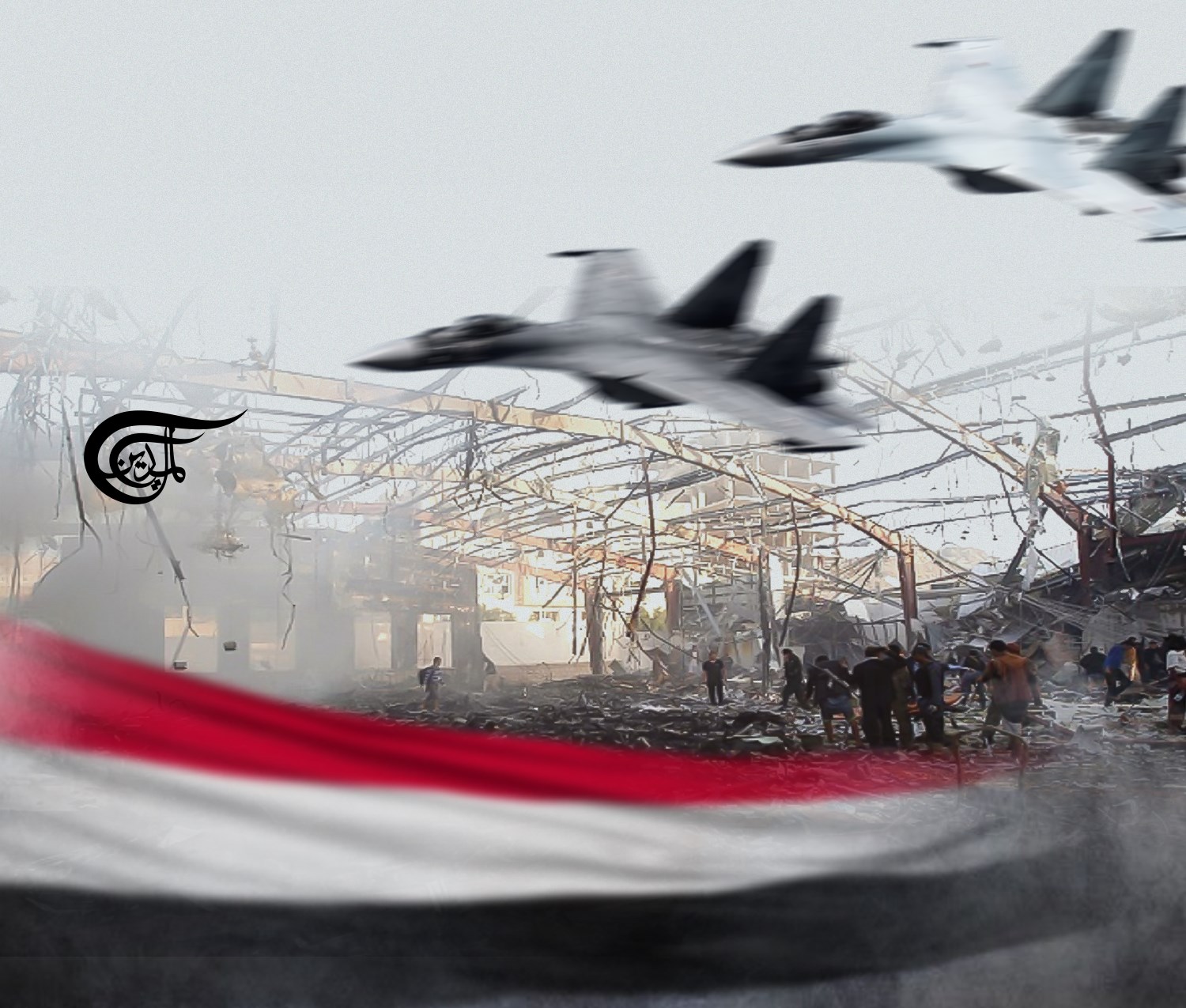Remembering the deadly funeral hall bombing in Yemen
Survivors say UNSC's failure in delivering aid to Yemenis is the worst and the ‘maximalist’ international response to a humanitarian crisis.
More than six years ago, Saudi airstrikes using US bombs targeted the Grand Hall in Sanaa on October 8, 2016, killing 140 mourners and injuring over 700 others as they were gathered to pay tribute to former Interior Minister Jalal Al-Rowaishan over his father's death. Al-Rowaishan wasn't at the Hall when the strikes hit.
-

Grand Hall in Sanaa on the sixth anniversary of the massacre, October 11, 2022 (Al Mayadeen English/Naseh Shaker)
To this day, unresolved trauma remains and survivors of the massacre are still seeking justice and punishment, and not an apology from the US and Saudi Arabia.
Naji Al-Rowaishan, 24, survived the massacre by sustaining burns and remained in the hospital for over a month after he received news of his father's death, Yahya Hasan Al-Rowaishan, who was severely injured in the hall.
"The sixth anniversary passed with great sadness, renewing the pain and tragedy, as the massacre was there to stay throughout the past six years", Al-Rowaishan told Al Mayadeen English.
-

Grand Hall in Sanaa on the sixth anniversary of the massacre, October 11, 2022 (Al Mayadeen English/Naseh Shaker)
"The countries of aggression, like UAE and Saudi Arabia, as well as the mercenaries from Al-Islah Party, bear the responsibility of the massacre," he explained.
Al-Rowaishan rejected the coalition's investigation into this massacre, saying, "How can we accept an investigation run by the enemy and perpetrators of the crime?"
"How can anyone accept that the killer judge himself, because if so, he will absolve himself and point fingers at others, and this is just what Saudi Arabia and America did, for they acquitted themselves and blamed the Yemeni mercenaries," said Al-Rowaishan.
He said the US' role in this crime is "pivotal in planning and targeting," given that the US has been leading the Saudi coalition.
Al-Rowaishan sent a strong-worded message to President Biden who said the massacre was carried out while he was a Vice President, saying, "You and your administration will be held accountable, and blood will only be washed by blood... How, where, and when will this happen? Only time will tell."
-

Naji Al-Rowaishan, who lost his father in the attack on the hall, while at the hospital receiving treatment for burns he sustained (Photo courtesy of Naji for Al Mayadeen English)
'Apparent war crime'
Fahd Abdulwahab, the current guard of the Grand Hall, said the event was so traumatizing that he was unable to get out of his home for two years, and recalling what has changed in his life, he said, "This is going to damage my mental health."
"I survived because I was outside the Hall during the first airstrike," Abdulwahab told Al Mayadeen English from the window of his home in the western yard of the Hall. He was so disinterested in getting out. "I didn't rush into the Hall to rescue mourners, but I went to rescue my children."
"I found that they were not injured, but all the windows and doors were shattered, so I decided to move them into a relative's home in Haddah," explained Abdulwahab.
The Saudi coalition launched double-tap airstrikes on the crowded Hall during the funeral ceremony of Jalal Al-Rowaishan's father. Human Rights Watch (HRW) said the Saudi-led coalition attack on the "crowded funeral ceremony" is "an evident war crime."
HRW also identified the munition used as "a US-manufactured air-dropped GBU-12 Paveway II 500-pound laser-guided bomb."
'Law of retaliation'
The Saudi coalition denied responsibility for this massacre at first, just like several other war crimes, and then backtracked and admitted to it. A statement by the coalition's investigation team claimed that a party they chose not to name had provided intelligence that "Houthi rebel leaders were in the packed Hall in Sanaa."
The only party that was providing the Saudi-led coalition with intelligence, military advice, logistical support, and "more information about potential targets" was the United States.
“After unlawfully attacking schools, markets, hospitals, weddings, and homes over the last 19 months, the Saudi-led coalition has now added funeral ceremonies to its ever-increasing list of abuses”, said Sarah Leah Whitson, Middle East, and North Africa Director at HRW on October 13, 2016.
Whitson also said, “An independent international investigation of this atrocity is needed as the coalition has shown its unwillingness to uphold its legal obligations to credibly investigate."
However, the Saudi coalition decided to investigate its own "atrocity" and announced days later that “appropriate action ... must be taken against those who caused the incident, and ... compensation must be offered to the families of victims."
"No actions nor compensations were offered to the families of the victims or survivors, nor to the owner of the Hall," said Abdulwahab. "The coalition statement is as bad as UN organizations that claim to be defending human rights while they are working to bury this massacre."
The attack killed at least 140 according to the UN, while the number of wounded mourners according to figures provided by health officials was over 700, including children.
"The actions can be taken by applying the law of retaliation stated in this holy Quran verse: 'whoever then acts aggressively against you, inflict injury on him according to the injury he has inflicted on you...,'" Abdulwahab told Al Mayadeen English.
'Massacre in every sense of the word'
Mohsen Ali Qawber, a nurse at Al-Somod Al-Araby Medical Center located 120 meters north of the Grand Hall, said he was at the Center during the airstrikes on October 8, 2016, at 3:30 pm.
"I was at this center during the first airstrike. I was wondering why this hall was targeted by an airstrike and I suddenly saw people running out of the Hall. Then after 10 minutes, the second airstrike hit again," Qawber told Al Mayadeen English.
"Since the Center is very small and could only cater to 20 cases, we closed it and all the staff turned into rescuers, giving First Aid to the injured and moving victims into large hospitals like The Republican and Al-Thawra," said Qawber.
"My home is also 10 meters from the Hall, but I was not able to reach my residence to see my children because corpses and wounded people were strewn on the road," said Qawber, stressing that some wounded were asking for help, thus preventing him from moving forward to reach his family.
"It was a massacre in every sense of the word," he noted.
"It was a heinous massacre to turn one funeral into 140 funerals, and the families of victims were reluctant to hold a funeral ceremony out of fear of becoming another target for US-Saudi airstrikes," Qawber said.
"I've not heard or read of such a crime in modern history. It was inhuman, immoral, and ruthless."
"The coalition of hooligans is responsible for this disaster," explained Qawber, refusing to name the Saudi coalition by its official name. "Saudi Arabia is a tool; this is an American and Zionist coalition against Yemen."
US involvement
Mohammed Al-Hammadi who lives at the eastern zone of the Hall said he survived the attack, along with all the residents of the five-story building where he lives and works as a guard, after the airstrikes hit his home hard and damaged the windows and doors, with no civilian casualties recorded.
-

Mohammed Al-Hammadi standing near his home and in the background the grand hall where 140 mourners were killed, October 11, 2022 (Al Mayadeen English/Naseh Shaker)
"I was not able to rescue others because I was wishing that someone could rescue me and protect the building I was guarding," Al-Hammadi told Al Mayadeen English.
"This massacre should not go unpunished. If the perpetrators of this massacre were punished, other crimes like the Saada school bus children and Dhamar and Saada prisons massacres would not have happened," he said.
This was a massacre perpetrated by the coalition but it was kind of the former Minister’s mistake as well, having opened the funeral Hall to the public in time of war, facing a barbarian coalition whose goal is to kill as many Yemeni civilians as it can under the pretext that they are 'Houthis', although there was no presence of Ansar Allah at the hall," said Al-Hammadi.
"The UN and its Security Council can do nothing to punish perpetrators because they are Americans. The Council said Yemenis' claims for the payment of salaries to extend the truce are 'maximalist', but what is really maximalist is the UN and its security council's silence over massacres like this," he added.
On October 5, 2022, the UN Security Council issued a statement, three days before this massacre anniversary, describing the demands of paying salaries of all government servants to expand the truce as "maximalist".
"Since this massacre is an imprescriptible offense, punishment will reach perpetrators sooner or later, including UN officials who maintain silence over this crime," Al-Hammadi explained.
"We have a proverb that says 'when earth's justice is absent, heavenly justice comes down'; that is represented in earthquakes, storms, and diseases like Covid-19," said Al-Hammadi.
"As a survivor, the US is complicit in this massacre. If it was not complicit, it would have at least stopped selling weapons to Saudi Arabia or sanctioned the leaders of the coalition who killed civilians just as it sanctioned Russia and China over alleged human rights violations, but nothing happened, which means that the US is directly involved in this massacre," noted Al-Hammadi.

 Naseh Shaker
Naseh Shaker
 9 Min Read
9 Min Read











